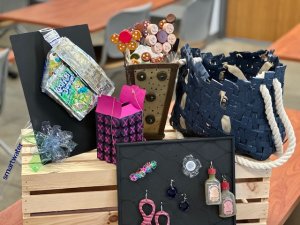By Jonah Grinkewitz
Old Dominion University students and staff recently worked together to promote sustainability in the fashion industry and provide free clothes to students in need.
This past Halloween, ODU’s Office of Leadership and Learning hosted “Spooktacular Monarch Thrift” in the University’s Webb Center, where more than 370 students perused and took home 960 pounds of donated and gently worn clothing.
“There was a crazy long line this morning,” said Madison Raley, a fashion merchandising student who volunteered at the event. “That’s really great to see, that (the clothes) don’t have to go to waste.”
She and her classmates created signage for the event raising awareness of the impacts of “fast fashion,” including information about the more than 25 million pounds of clothes that end up in landfills or incinerators each year.
Joy Kelly, an adjunct faculty member who teaches a course on fashion sustainability, said the goal of sharing information is not to shame consumers, but to inform them.
“It isn’t wise to dictate what people should do or accuse them of trashing the world,” she said. “Awareness, meaningful data, honest conversations, education, acceptance and manageable changes are great places to start slowing the fast-fashion movement.”
Students who “purchased” clothes at the event also received a flyer with information on resources for food, clothing, rent and utility assistance through ODU and other community groups.
Kara Boone, assistant director for service learning in the Office of Leadership and Learning, said that by sharing information through a fun event like Monarch Thrift, they hope to reduce the stigma around asking for help.
“Some people really need the items but feel embarrassed,” she said. “It’s OK to ask for help.”
Resources on Campus
The Monarch Clothing Closet is in room 1007 of the Visual Arts Building and is open to students with a current ODU ID.
Previously called the Big Blue Closet and run through ODU’s Strome College of Business, it provided professional clothing and accessories to students.
Working with ODU’s chapter of Enactus United States, the Office of Leadership and Learning expanded it to also provide all clothing and outerwear including jackets, shoes and accessories.
Boone said that having a permanent space where clothes can be displayed on racks creates an inviting environment where students can browse clothes as if they were in a store.
“If students need something, it doesn’t have to be pulled out of a bin,” she said.
Another resource is the Monarch Food Pantry, located in Webb Center and open from 10 a.m. to 3 p.m. on Tuesdays. Run by student volunteers, it provides free food to students who are registered for classes during the current semester.
“We’re all about ‘students helping students,’” Boone said.
ODU Sustainability Collective of Fashion Students
Kelly tasked the students in her sustainability course to inspire social change around clothing consumption through meaningful projects and community engagement.
Inspired by their goal, the students gave themselves a name: The ODU Sustainability Collective of Fashion Students.
With the help of a Service Learning “Mini-Grant” from the Office of Leadership and Learning, which provides up to $1,000 for courses that support service learning on the local, state or national level, the class set up a booth at the Barry Art Museum’s Fantastic Planet Public Arts Festival in early October to raise awareness of the role consumers and the fashion industry play in microfiber pollution in waterways.
The project also tied into ODU’s 2023 “Blue Connections” Annual Campus Theme, which focuses on the crucial role oceans and waterways play in society and the global economy.
The students shared facts, such as how 20% to 35% of microplastic pollution comes from synthetic clothing (rayon, nylon, polyester, etc.), and solutions, like washing your clothes at a colder temperature to reduce the shed of microfibers.
They also conducted an anonymous survey with festival goers about their attitudes toward the issue and willingness to make changes to their consumption and designed fashion products using waterway debris.
For another project in November, they designed a “Fashion and Function” show at the Barry Art Museum featuring garments that eliminate pain points experienced by people with disabilities. The design elements focused on flexibility, simplicity in use, low physical effort and equitable use.
Jazmine Bernardin, a student in the class who wants to be a fashion designer, said that in addition to learning more about sustainability and the ways that fashion ties into our lives, the class projects have helped her hone her sewing skills.
The program has also opened doors for students who want careers in the industry outside of design.
Bella Goglia, another student in the class, said she wants to open her own business after she graduates.
“Being involved in this major and the events we do helps me get my foot in the door, talking to people in the community and networking,” she said.
To learn more about ODU’s fashion merchandising major, click here.

